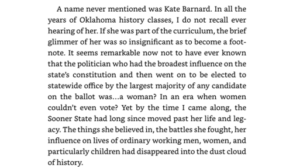Kate Barnard was born in 1875 in Nebraska. Her mother died when she was two years old and she was raised by relatives. When she was 16, she moved to be with her father, who had a land claim in Oklahoma. She would later move to Oklahoma City, where she obtained a teaching certificate. She taught for only a few years.
After teaching, Kate became involved with the territorial legislature. Oklahoma had yet to become a state. It was her selection as the territorial hostess at the St. Louis World Fair that changed the course of her life. This was when she became aware of social injustice and became reform-minded.
As Oklahoma was nearing statehood, Kate became involved in meetings that led to the drafting of the Oklahoma State constitution. In the constitution that evolved, there was only one elected position that women were allowed to hold: Charities and Corrections Commissioner. Kate ran for the Commissioner’s position and was elected for two four-year terms.
As a commissioner, she pushed through legislation for compulsory education, a widow’s support fund, bans on child labor, safe work conditions, and union employee protections. She also shamed the first Governor of Oklahoma for returning to Oklahoma prisoners that he had been transferred to Kansas. There, they were abused and tortured.
After her political career had ended, Kate became an advocate for Native American children. Because of federal legislation and Oklahoma business practices, the land that had been promised to Native Americans had been stolen from them. Kate fought to stop this practice called grafting. (See Just Imagine: Grafting for more information)
For all of what she achieved in her life, Kate Barnard remains little known. And that has been intentional. Lisa Wingate, a New York Times best-selling author, in her book Shelterwood weaves the story of Kate Barnard into her novel. In the Author’s Note at the end of the book, she describes her Oklahoma history education.
Hidden heroes can often make those in power very uncomfortable. When they are gone, their legacy disappears with them. Such is the fate of a remarkable woman called Kate Barnard.
* * *
“History does not long entrust the care of freedom to the weak or timid.”–Dwight D. Eisenhower
